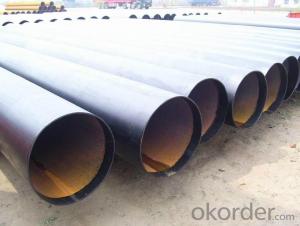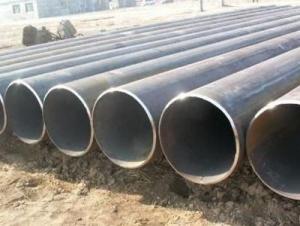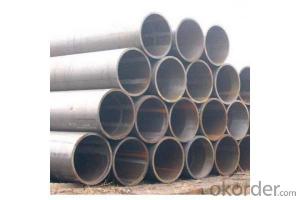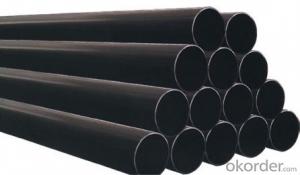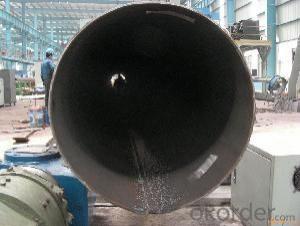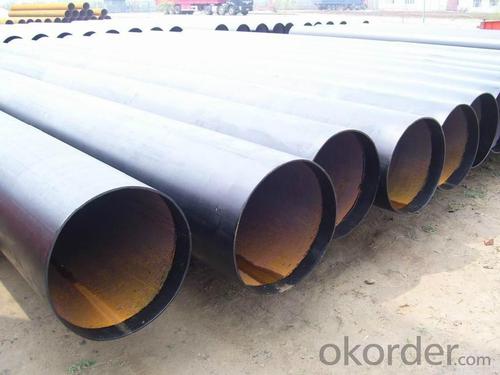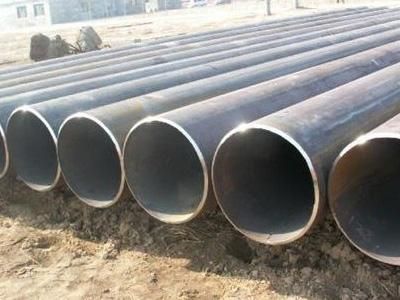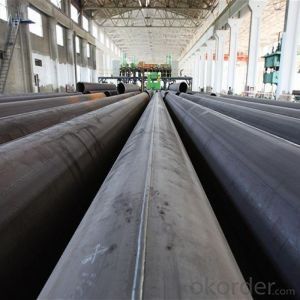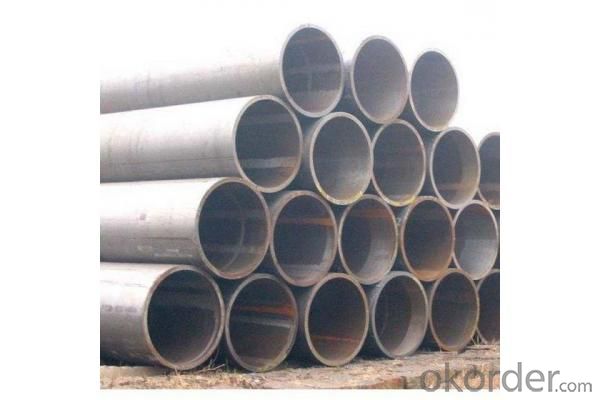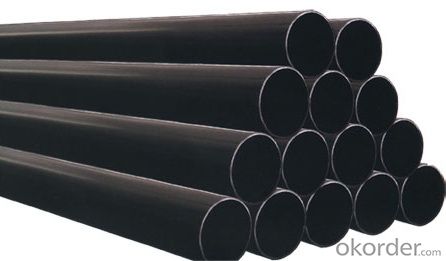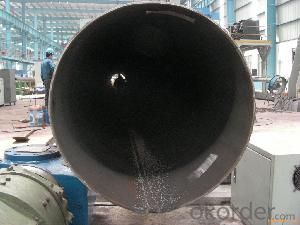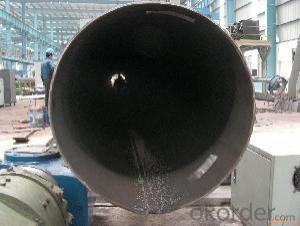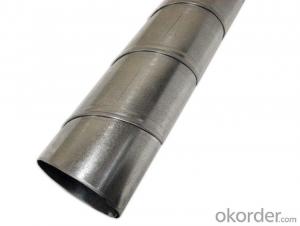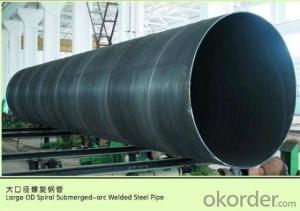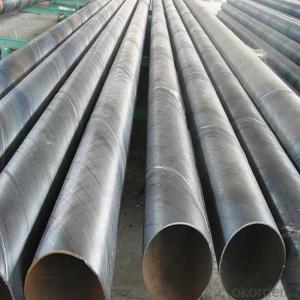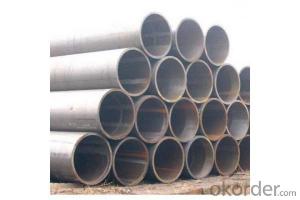LSAW SSAW CARBON STEEL PIPE ASTM API 10''
- Loading Port:
- Tianjin
- Payment Terms:
- TT OR LC
- Min Order Qty:
- 1 m.t.
- Supply Capability:
- 3000 m.t./month
OKorder Service Pledge
OKorder Financial Service
You Might Also Like
Packaging & Delivery
Packaging Detail: | Normal exporting packing,in container or bulk vessel or as per clients' request |
Delivery Detail: | 2 months after confimed contract |
Specifications
Large Diameter API 5L X70 PSL2 LSAW Steel Pipe
Grade: X42, X46, X50, X52, X60, B, C
OD: 1.5"-28"
WT: SCH10-SCH160
Large Diameter API 5L X70 PSL2 LSAW Steel Pipe
Specifications:
u Standard: API 5L
u Grade: B, C, X42, X46, X50, X52, X56, X60, X65, X70, X80
u OD: 1.5"-28"
u WT: SCH10-SCH160
u Length: 5-12m
u Ends Finish: plain end, bevel end, grooved end
u Surface Treatment: bare, black varnished, oiled finish, red color, anti-corrosion, 3PE, FBE or epoxy coating
u Technique: hot rolled or cold drawn
u Application: api 5l steel pipe for conveying oil, water, gas
u Invoicing: based on theoretical weight or actual weight
u Payment Terms: L/C at sight, T/T or Western Union
u Trade Terms: FOB, CFR, CIF
u Certification: ABS manufacturing assessment, ABS design assessment, API 5CT, API 5L, DNV manufacturer certificate, ISO9001 quality management system certificate, ISO14001 environment management system certificate, GB/T28001 occupational health and safety management system certificate, A1 class manufacturing license of special equipment certificate, CCS, GL, LR, SGS, TüV, PDE
- Q: What is the difference between steel pipes and PVC-M pipes?
- The main difference between steel pipes and PVC-M pipes lies in their material composition. Steel pipes are made of steel, which gives them higher strength and durability. They are commonly used for high-pressure applications and in areas where the pipes may be exposed to extreme conditions or corrosive substances. On the other hand, PVC-M pipes are made of polyvinyl chloride modified with certain additives to enhance their impact resistance and toughness. They are lightweight, easy to install, and resistant to corrosion, making them suitable for various applications, including water supply, irrigation, and drainage systems. While steel pipes offer superior strength, they are more expensive and require regular maintenance, such as anti-corrosion treatments. PVC-M pipes, on the other hand, are more affordable, require minimal maintenance, and can be easily joined using solvent welding or mechanical fittings. In summary, the choice between steel pipes and PVC-M pipes depends on factors such as the intended use, budget, and environmental conditions.
- Q: How are steel pipes classified according to their wall thickness?
- Steel pipes are classified according to their wall thickness into three categories: schedule, standard, and extra strong.
- Q: What are the common applications of galvanized steel pipes?
- Galvanized steel pipes are commonly used in various industries and applications such as plumbing, water supply systems, gas pipelines, electrical conduits, construction projects, fencing, and outdoor structures. The galvanization process adds a protective zinc coating to the steel, making it resistant to corrosion and extending its lifespan, making it ideal for applications requiring durability and longevity.
- Q: What are the advantages of using steel pipes in the manufacturing of appliances?
- There are several advantages of using steel pipes in the manufacturing of appliances. Firstly, steel pipes are extremely durable and can withstand high pressures, making them ideal for applications that require strength and resilience. Secondly, steel pipes have excellent corrosion resistance, ensuring that the appliances will last longer without succumbing to rust or degradation. Additionally, steel pipes have a smooth interior surface, which minimizes friction and allows for efficient flow of fluids or gases within the appliances. Lastly, steel pipes are readily available and cost-effective, making them a practical choice for appliance manufacturers.
- Q: Can steel pipes be recycled and used for other purposes?
- Yes, steel pipes can be recycled and used for other purposes. Steel is a highly recyclable material, and steel pipes are no exception. Recycling steel pipes helps to conserve natural resources and reduce the demand for new steel production. When steel pipes are recycled, they are typically sent to a recycling facility where they are sorted, cleaned, and processed. The pipes are then crushed into smaller pieces or melted down to be reshaped into new steel products. Recycled steel pipes can be used for a variety of purposes. They can be used in construction projects, such as for building bridges, roads, or buildings. They can also be used in the manufacturing of new steel products, such as automotive parts, appliances, or furniture. Additionally, recycled steel pipes can be used in the energy sector, for example, in the production of wind turbines or oil and gas pipelines. Using recycled steel pipes not only helps to reduce waste and conserve resources but also has environmental benefits. The recycling process requires less energy and produces fewer greenhouse gas emissions compared to the production of new steel. Therefore, recycling steel pipes is a sustainable option that contributes to a circular economy and helps to protect the environment.
- Q: How do you calculate the pipe flow rate coefficient for steel pipes?
- To calculate the pipe flow rate coefficient for steel pipes, you need to consider various factors related to the pipe's dimensions, material properties, and the fluid flowing through it. The pipe flow rate coefficient, also known as the discharge coefficient (Cd), is a dimensionless value that represents the efficiency of fluid flow through a pipe. Here are the steps to calculate the pipe flow rate coefficient for steel pipes: 1. Determine the inside diameter (ID) of the steel pipe. This is the measurement of the internal cross-sectional area of the pipe through which the fluid flows. 2. Calculate the pipe's cross-sectional area (A) using the formula: A = π * (ID/2)^2. Here, π is the mathematical constant pi (approximately 3.14). 3. Measure the pressure drop (∆P) across the steel pipe. This is the difference in pressure between the pipe's inlet and outlet. 4. Measure the fluid flow rate (Q) through the pipe. This can be done using flow meters or by measuring the time it takes for a known volume of fluid to pass through the pipe. 5. Calculate the velocity (V) of the fluid flowing through the pipe using the formula: V = Q / A. Here, Q is the fluid flow rate and A is the cross-sectional area of the pipe. 6. Calculate the pipe flow rate coefficient (Cd) using the formula: Cd = Q / (A * √(2 * ∆P / ρ)). Here, ρ is the fluid density. This formula is derived from the Bernoulli's equation and takes into account the pressure drop, fluid flow rate, and fluid density. It is important to note that the pipe flow rate coefficient for steel pipes can vary depending on factors such as pipe roughness, fluid viscosity, and Reynolds number. Therefore, it is advisable to consult relevant engineering standards, such as the Darcy-Weisbach equation or the Hazen-Williams equation, to obtain more accurate values for specific pipe configurations and fluid properties.
- Q: What are the different types of flanges used with steel pipes?
- There are several types of flanges commonly used with steel pipes, including slip-on flanges, weld neck flanges, socket weld flanges, threaded flanges, blind flanges, and lap joint flanges. Each type has its own specific design and purpose, catering to different requirements such as ease of installation, high-pressure applications, or connecting different pipe sizes.
- Q: What are the different surface finishes available for steel pipes?
- Some common surface finishes available for steel pipes include black or bare (uncoated) finish, galvanized finish, and coated finishes such as epoxy, polyethylene, or polypropylene. These finishes provide varying levels of protection against corrosion and can be chosen based on the specific application and environmental conditions.
- Q: How are steel pipes classified based on their wall thickness?
- Steel pipes are classified based on their wall thickness into three categories: standard, extra strong, and double extra strong.
- Q: What is the difference between seamless and welded steel pipes?
- The main difference between seamless and welded steel pipes lies in their manufacturing process. Seamless steel pipes are made by piercing a solid billet to form a hollow tube, while welded steel pipes are formed by rolling a flat sheet of steel into a tube and then welding the seam. This difference in manufacturing leads to varying characteristics such as strength, appearance, and cost. Seamless pipes are generally considered to have higher strength and are more aesthetically pleasing, but they are also more expensive to produce. Welded pipes, on the other hand, are more cost-effective and suitable for less demanding applications.
Send your message to us
LSAW SSAW CARBON STEEL PIPE ASTM API 10''
- Loading Port:
- Tianjin
- Payment Terms:
- TT OR LC
- Min Order Qty:
- 1 m.t.
- Supply Capability:
- 3000 m.t./month
OKorder Service Pledge
OKorder Financial Service
Similar products
Hot products
Hot Searches
Related keywords
